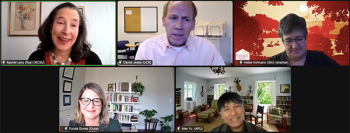

NISS hosted a fascinating panel with faculty in academic departments from different schools addressing the issue of whether Statistics Departments in academic institutions should integrate or change their title to Data Science. (see Event page) We had quite a substantial debate from our panelists and much of our audience chimed in with their questions.
Our panelists included speakers: Heike Hofmann, Professor in the Department of Statistics and Professor in Charge of the Data Science Program at Iowa State University; Funda Gunes, Director of the Master's Program in Statistical Science at Duke University; Rachel (Ray) Levy, Professor in the Department of Mathematics and is the Executive Director of the North Carolina State University Data Science Academy (DSA); and Alex Yu, Director of Data Analytics at the Office of Institutional Research at Azusa Pacific University. NISS gives a huge thank you to Dan Jeske, Vice Provost of Academic Personnel and Professor in the Department of Statistics at the University of California, Riverside, who was the organizer of the event and moderator for this panel discussion!
Data science as a field arguably began back in 1960s, however, the data science revolution really became noticeable at the start of the 21st century when it became recognized as an emerging discipline as its own. Since that time, data science certificates and data programs have emerged even when a definition of data science was not universally agreed upon. Meanwhile, traditional statistics departments have been contemplating whether and how to manage this new discipline with their programs. This panel aimed to reset the conversation of how statistics and data science might co-exist in academic departments.
Our panelists shared their varied experiences describing how data science programs are organized at their campus, including undergraduate, graduate, and professional programs, as applicable. Some of the preliminary questions that our panelists answered for our audience included: What are the key decisions that need to be made in starting up or sustaining data science programs at a campus? What challenges were encountered when reaching the present organization of data science programs at your campus?
Key topics discussed:
- Universities collaborate with industries and organizations to help students in their professional development and particular degree program to secure a position. Many industries lately prefer hiring students with data science degrees or integration with data science in their degree which include courses in their department’s curriculum.
- There are several newly added programs in data science applications that were not already included in statistics departments. This could be another reason to integrate with data science. Is this an either-or situation, it is possible to have both.
- There have been recent declines in student enrollment in statistics departments. This could be caused by either a lack of interest or caused by the COVID-19 pandemic. Some departments have decided to change the name to try to attract more students.
- Undergraduate, PhD, MS programs, or even Interdisciplinary Data Science programs have different focus tracks and a single department in data science might not offer everything that a statistics degree would offer. Would this be a reason to keep traditional statistics within the degree?
Many of our attendees submitted questions during the zoom webinar, in addition to some of our preliminary questions for this panel. These included:
- What are the important curriculum topics that should be included in a data science program?
- What do you feel are the strengths and weaknesses of the organization of data science programs at your campus?
- Are there roles for online programs in data science and/or statistics, and are they different?
- It is 20 years too late (one might argue 50 years), but permit me to state the obvious: data science is statistics. A working definition of statistics is "the branch of science that studies how to gain reliable conclusions from data." Statistics has been heavily involved with high-level computing, data management, and visualization ever since computers became available. Did the field of statistics simply lose the PR battle to other disciplines and fail to respond to the applied data analysis needs of the world at large?
- For MS students in Applied Statistics, what CS courses should be taken to be a good data scientist?
We thank everyone on the panel who gave such tremendous input on this issue and are definitely excited to keep this conversation going. We have a full recording of this session available on our NISS Communications YouTube Channel linked below
